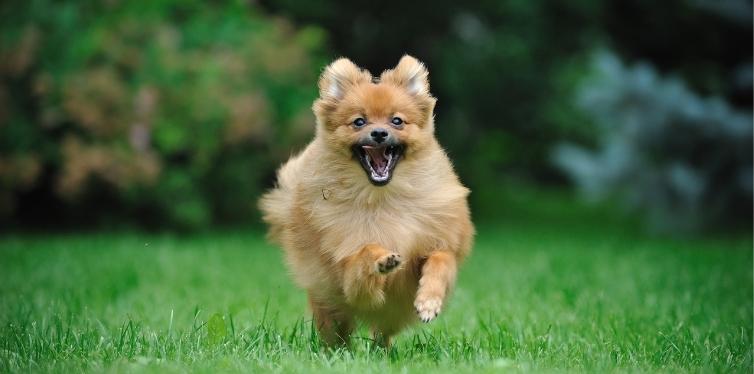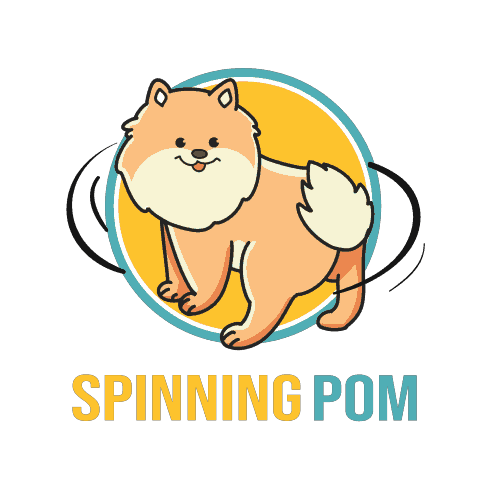Have you ever heard a cough coming from your Pomeranian that sounded like a honking noise? The first time I heard it I thought my Pomeranian was sick, but the real problem was that she was suffering from a common Pomeranian health problem called a collapsed trachea.
Defining a Collapsed Trachea

“What the heck is a collapsed trachea?”, you might be asking. Well for starters, it sounds much worse than it actually is. And thankfully it’s not a painful problem for your Pomeranian, only discomforting. As was the case for the luxating patella, a tracheal collapse is quite common among smaller dogs including Chihuahuas, Toy Poodles, Shih Tzus, Lhasa Apsos, Maltese, Pugs, and Yorkshire Terriers. Pretty similar to the luxating patella club!
A collapsed trachea is a medical issue that obstructs the airway of dogs. The trachea, or “windpipe”, is made up of cartilage rings that support the airway so that air can easily pass to and from the lungs of your Pomeranian. What happens with our Pomeranians though is that those tracheal rings start to collapse causing the airway to constrict. This is the major reason why we hear a honk sounding cough from our Pomeranians.
This mainly occurs in Pomeranians during their older years, in particular around six to eight years old. However, it can happen to younger Pomeranians, even though it’s a rare situation.
There are a few situations where you’d be able to tell quite easily if your Pomeranian has a tracheal collapse. For example, if they’re playing a lot and having an exciting time only to get tired very quickly and start coughing. This is probably the most common situation and I’ve seen it many times.
I’ve also noticed other Pomeranians who after eating and drinking began to cough with that goose honking sound. It’s also not a good sign if you see your Pomeranian gagging while eating. I’ve definitely seen these situations occur, and they usually lead to potential signs that your Pomeranian has a collapsed trachea. If you hear this, consider getting them cough medicine for dogs with collapsed trachea.
Another situation is if they’re exposed to smoke or dust on a regular basis and they begin to cough. This, of course, should be avoided at all costs. Not only is it bad for their lungs but it’s also potentially affecting their coats and skin negatively as well as reducing their lifespan.

Also, Pomeranians can show signs of having a collapsed trachea if they start to cough during hot and humid weather. This to me initially sounded quite strange, but I’ve learned that the moist air can cause our Pomeranians to cough, which could then show if they have a tracheal collapse or not.
One of the positive characteristics of this Pomeranian health problem, besides it not causing physical pain, is that the coughing episodes last a very short time. And since they’re triggered by certain situations, they normally only begin to cough with that honking sound during those times.
Diagnosing a collapsed trachea by a professional veterinarian is very important if you begin to see these signs. It’s very likely they could have it based on these signs and catching it early can help alleviate the discomfort of your Pomeranian.
If you take your Pomeranian to the vet, they’ll most likely ask you about the signs that led you to assume your Pomeranian has a tracheal collapse and then perform some tests. The most common test to perform right away is using radiograph or X-rays. Based on these X-rays, it should be very clear whether or not your Pomeranian has a collapsed trachea.
There is another test that’s performed if the X-ray is not telling enough, which is called a fluoroscopy. A Fluoroscopy is like watching a video made of X-rays. This allows the vet to see the trachea in action instead of just one picture at a time.
We’ve walked through what to look for when determining if your Pomeranian has a tracheal collapse. It’s important to keep a close eye on your Pomeranian whenever they’re taking part in any of these activities so that you can see if any of the common signs show up. However, it’s also important to know the causes of a collapsed trachea, which can always give us better insights into what’s going on with our Pomeranians.
Causes of a Collapsed Trachea

Being able to pinpoint the causes of all types of Pomeranian health problems can help us better understand what’s going on with our Pomeranians. Also, knowing the causes can give us insight into how we can prevent and treat the issues that arise from them.
Similar to a luxating patella in Pomeranians, the main cause of a collapsed trachea is that it’s either a birth defect or passed down from our Pomeranian’s biological mom and dad. Why do all these Pomeranian moms and dads have a tracheal collapse though?
Our Pomeranians come from a long lineage of very strong, Arctic working dogs that were pushed during tough situations. They were true working dogs in northern Europe and were heavily depended on.
However, people began to own them more for companionship and over time began breeding them with smaller dogs. As time went on, they shrunk in size and took on genetic characteristics from all kinds of dogs, including the original Pomeranian.
This long history of mixing breeds usually leads to some unplanned genetic defects, which is one of the reasons small dogs carry many of the same health issues. Although they may have some minor health problems, they still live long and happy lives and are the cutest things ever!
What this genetic defect ends up producing is a reduction of the tracheal’s important molecular components, including calcium, chondroitin (one of the active ingredients in supplements to help dogs with collapsed trachea), and other components. Over time, the reduction of these components can cause a tracheal collapse in Pomeranians and other small dogs.
Along with genetics, a tracheal collapse can be acquired through other ways. These other causes including Cushing’s Syndrome, heart disease, and chronic respiratory disease and infection.

Cushing’s Syndrome can occur in our Pomeranians when they have prolonged exposure to high levels of cortisol. Cortisol is the chemical inside humans, dogs, and other animals that put us on alert when there’s a potential threat close by. Think about the last time you saw a spider crawling across the bathroom floor. Thankfully, there are ways to calm down your Pomeranian.
Another cause is heart disease and is the result of a poor diet and lack of exercise. I know I’m getting into prevention right now, but I can’t help myself. One of the most important things we can do for our Pomeranians and ourselves is to eat healthy and wholesome food as well as use natural remedies whenever possible.
Chronic respiratory disease and infection can also cause a tracheal collapse. The problem here is that having a respiratory issue affects the lungs in a negative way. For dogs like Pomeranians that have a common health problem that affects the lungs, like a collapsed trachea, only compounds the problem. Our Pomeranians need strong, healthy lungs.
While it’s unavoidable for our Pomeranians to potentially have a birth defect, it is completely avoidable in terms of the acquired causes, like Cushing’s Syndrome, heart disease, and chronic respiratory disease and infection. It’s true that Pomeranians and small dogs are more likely to get it than bigger dogs, so it’s important to keep an eye on your Pomeranians.
Whenever you hear your Pomeranian coughing loudly with a goose honking sound or they’re gagging while eating their food or drinking their water, take note and call your local veterinarian.
Thankfully this Pomeranian health problem causes them virtually zero pain. It’s mostly an annoyance and discomfort, but it can deteriorate over time making the issues worse. That wouldn’t be fun for any Pomeranian, that’s for sure.
There must be ways to prevent a collapsed trachea from either getting worse or appearing at all. We want to reduce the amount of discomfort our Pomeranians have when showing signs of a tracheal collapse. Luckily there are ways we as Pomeranian parents can take to prevent discomfort and a rapid decline in our Pomeranian’s collapsed trachea.
How to Prevent a Collapsed Trachea

While it’s impossible to prevent a collapsed trachea if it’s caused by a birth defect, there are ways to prevent it when it comes to the acquired causes, like Cushing’s Syndrome, heart disease, and chronic respiratory disease and infection. Even if your Pomeranian has a birth defect, which is the most common cause of a tracheal collapse, there’s still plenty of time in your Pomeranian’s life before it normally happens. This amount of time is usually between six and eight years.
As we discussed in the previous section, the main reason for our Pomeranians to have a collapsing trachea is through a genetic defect. However, even with a genetic defect we still have reasons for why the tracheal collapse occurs in the first place. This reason is a reduced amount of calcium, chondroitin, and other molecular components inside of our Pomeranians.
A reduction in these essential molecular components reduces the strength of the cartilage tubes our Pomeranians’ windpipes depend on. When these tubes break down, the windpipe narrows. This restricts the pathway for air to easily flow through. Isn’t there a way to potentially help our Pomeranians make up for these molecular mishaps?
The answer is yes! There are supplements and other natural remedies that exist that can potentially help your Pomeranian reduce the chances or at least reduce the speed of a collapsed trachea occurring, which are also useful for luxating patellas in Pomeranians.
These supplements help strengthen joints and cartilage in dogs and often come with similar ingredients, including glucosamine, chondroitin, MSM (methylsulfonylmethane), turmeric, vitamin C, and vitamin E. Interestingly, the ingredients are also present in joint and cartilage supplements for people and were proven to be effective on our puffy Pomeranians!
I believe that every Pomeranian should be taking supplements like these whether or not they have a collapsed trachea. The reason being is that you never know if your Pomeranian will show up with symptoms of a tracheal collapse, and there’s usually plenty of time before it starts occurring in their lives.

I cannot stress enough the importance of actively caring for your Pomeranian by providing them with the correct care and supplements to counteract and reduce the common health problems they’ll likely endure in their lives. I know each and every one of us loves our Pomeranians so much! And that’s the reason why being active in their health is so important.
When considering the preventive measures for the more acquired causes, like Cushing’s Syndrome, heart disease, and chronic respiratory disease and infection, there are certainly ways of avoiding these problems.
As we discussed earlier, Cushing’s Syndrome can occur in our Pomeranians when they have prolonged exposure to high levels of cortisol. Cortisol is the chemical inside humans, dogs, and other animals that put us on alert when there’s a potential threat close by.
A clear way to avoid our Pomeranian’s from ever being diagnosed with Cushing’s Syndrome is to keep their cortisol levels low. What this means is to make sure your Pomeranian isn’t often times in stressful scenarios, like being yelled at, being around other aggressive dogs, and even around children chasing them. What doesn’t count is when they get excited and start spinning for their parents. Of course, our Pomeranians can still have fun, just less stress!
When preventing heart disease in our Pomeranians to ultimately avoid them developing a collapsed trachea, there are quite easy ways to go about this. One, make sure your Pomeranian eats quality dog food from trusted brands. Second, try not to give your Pomeranian certain human food, even though it makes them super happy.This is cause for bad health and potential behavior.
Third, don’t feed your Pom chocolate as this can cause overly rapid heartbeats and can lead to heart attacks. Fourth, give your Pomeranian sufficient exercise without straining them. Their health is important, and following these simple steps can lengthen their lives substantially!
Avoiding respiratory disease and infection can be as simple as keeping your house dust-free ad removing the situations in which your Pomeranian would be exposed to smoke. I’m assuming your Pomeranians don’t smoke themselves, so I’ll keep that out!
Another way to potentially prevent your Pomeranian’s collapsed trachea from getting worse is to replace their normal collar with a dog harness. At least for my Pomeranians, this is way more comfortable and we all know how hard they like to pull on their leashes. At the very least, if they have a collapsed trachea already, this can help alleviate the discomfort and coughing episodes.
A collapsing trachea is a problem we’ve discussed quite heavily now, including the issue, causes, and potential preventions. However, we should also know if there are ways to treat it so our Pomeranians can live a life full of deep breaths and play.
Best Ways to Treat a Collapsed Trachea

We all want our Pomeranians to be happy and healthy members of our family and seeing them cough the way they do or gag while eating can be heartbreaking. Knowing what’s going on with our Pomeranian’s and how to prevent these issues are good ways to start helping them live better lives, but we still need to fix the problem.
A collapsed trachea, while not painful for your Pomeranian pup, can be very uncomfortable. Thankfully, there are treatments that are commonly used to help resolve this common Pomeranian health problem.
By and large, the most popular way to treat your Pomeranian’s collapsed trachea is by using cough suppressants, bronchodilators, corticosteroids, and antibiotics. These can help ease the discomfort your Pomeranian is experiencing without resorting to extreme measures like surgery. Among these four ways of treating a collapsed trachea, cough suppressants are by far the most popular.
Cough suppressants can really make a huge difference in the way your Pomeranian looks, sounds, and feels. There are many high-quality, over-the-counter cough suppressants that you can find that are specifically aimed at solving this problem. Many of these products are all-natural and provide a full list of ingredients that make them quite transparent and convenient.
These cough medicines are been developed using herbal ingredients to holistically support the tissues of the throat and entire upper respiratory tract of your Pomeranian. They can even help support your Pomeranian’s immune response to infection, improve throat and respiratory tissue health, and ease discomfort.
Bronchodilators, while a funny and difficult word to pronounce, are very effective in helping to treat a Pomeranian’s collapsed trachea. To start, they’re only available through a prescription, so your local veterinarian must prescribe it.
If your’re serious about getting your Pomeranian’s collapsed trachea treated, this is an excellent option because it was specifically developed to decrease resistance in the respiratory airway and increase airflow into the lungs. As a matter of fact, they’re a common treatment for people with asthma and chronic obstructive pulmonary disease!

Another method of treatment is through the use of corticosteroids, which are a kind of steroid hormone that commonly occurs in physical processes like stress response, immune response, and regulation of inflammation and metabolism.
In the end, it’s aimed at helping people and animals under all kinds of conditions, including asthma, chronic obstructive pulmonary disease, pneumonia, food allergies, and Cushing’s Syndrome. Talk to your veterinarian about how corticosteroids could help your Pomeranian get through their collapsed trachea.
Antibiotics are a popular choice to use because they’re used in the treatment and prevention of bacterial infections. The reason this is helpful for Pomeranians with a tracheal collapse is that the constant coughing can wear out the lining of the windpipe resulting in potential infections occurring. This is definitely not a good situation and should be an accompanying medication used to treat your Pomeranian’s collapsed trachea.
If there aren’t any signs of improvement when using any of these remedies, it may be time to talk with your veterinarian about surgery. It’s always wise to avoid surgery if you can because as we know there are always risks involved. However, sometimes it’s just unavoidable.
A common technique is to install prosthetic rings on the outside of the trachea to help hold the windpipe in position. The overall success rate of this surgery is between 75% and 85% and the outcome is generally poorer for dogs over the age of six. This is why it’s often a difficult decision to resort to surgery when it comes to collapsed tracheas in Pomeranians.
Final Thoughts
As usual, be sure to communicate as much as you can to an experienced veterinarian before resorting to any treatment. Also, be sure to check their past experience regarding having performed surgery in case you and your Pomeranian pursue that option.





